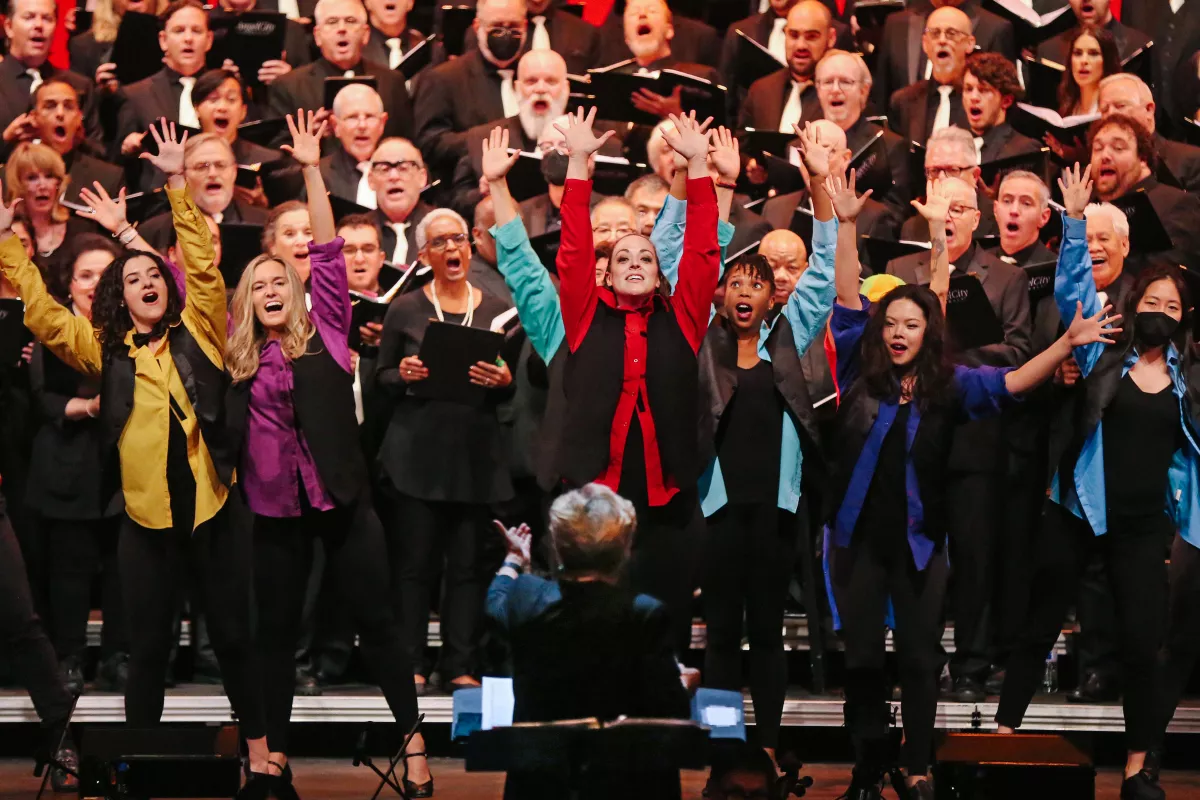
The Choir that Saved my Life
BY MICKEY RAPKIN
LA TIMES
JULY 13, 2023
Sue Fink started L.A.’s Angel City Chorale 30 years ago, in the back of McCabe’s Guitar Shop in Santa Monica. She’d been teaching voice lessons there when her girlfriend, Jane Emmer, said she was looking for somewhere to sing. It was early in the relationship and Sue offered to start a choir for her. “Jane goes, ‘I don’t like choirs,’” Sue, now 75, recalls. “I said, ‘You’ll like this one.’”
Sue was up for the challenge. She came from juicy L.A. stock; her father was the prominent entertainment lawyer Max Fink, who’d represented the Doors’ Jim Morrison in the singer’s 1969 obscenity trial. Her mother, Sybil, had been crowned Helen of Troy at USC (part beauty queen/part undergrad booster) before becoming a socialite. Ella Fitzgerald and Paul Newman were the family’s neighbors.
“Paul Newman would bring his kids trick-or-treating,” Sue says. Morrison would call at all hours of the night, saying: “Hey, Sue, I’m in trouble. I gotta talk to your dad.”
Despite Max Fink’s experience in the business (or perhaps because of it), he never wanted his daughter to pursue a music career. Or any career at all. Her father — and here Sue waves her hand — “he wasn’t really on this planet.” Sue studied music at UCLA and later toured as a singer-songwriter. A Freudian therapist her parents sent her to offered to share Sue’s music with a patient of his, who turned out to be Ray Charles.
Says Sue: “I’m getting phone calls, ‘Hey, it’s Brother Ray. Why don’t you come over to my studio?’ I was young — I was like 21, 22. I went over and he said, ‘Sit next to me on the piano.’ He played one of my songs that he’d learned.” He told her he’d like to record it — a major break for a young writer.
“Then he started calling me every day. ‘How about dinner tonight? How about breakfast tomorrow?’ And I just said, ‘Aren’t you married?’” When Sue wouldn’t agree to dinner, he suddenly lost interest in the song.
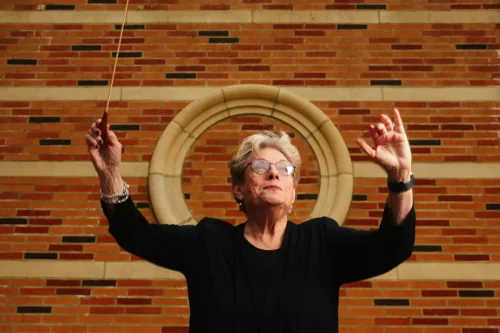
There would be other indignities. Sue later toured with her mentor Roger Wagner, then one of the country’s most prominent choral conductors. “Almost everything I know about choral music is from him,” she says, while acknowledging “he could be really mean.” She met Zubin Mehta, the onetime conductor of the Los Angeles Philharmonic, and pointedly asked him why there weren’t more women in the Phil. He told her women didn’t belong there. When Sue countered — weren’t the auditions blind? — Mehta revealed he could see their shoes beneath the curtain.
Nevertheless, she persisted. “My father wanted me to get married and be a nice wife,” Sue says. “Which I sort of did.” Her partner, Jane, a psychologist, still sings with the Angel City Chorale, which grew from 18 voices to some 180, diverse in race, sexuality and age, with singers as young as mid-twenties to confirmed octogenarians.
In 2016, Angel City recorded at Abbey Road Studios in London, with Sue conducting the Royal Philharmonic. The following year, the chorale’s cover of Toto’s “Africa” went viral and has since been streamed more than 23 million times on its YouTube channel.
But a 2018 semifinal run on “America’s Got Talent” provided the biggest bump. For the next couple of years, the group was regularly selling out 1,000-plus seat venues in Los Angeles. Then the pandemic happened and the world shut down.
It was a weird and dangerous time for everyone but particularly for singers. A choir in Mt. Vernon, Wash., drew national attention after one member showed up at rehearsal with COVID-19 symptoms and promptly infected something like 87% of its members, according to the Washington Post. “At least 40 people sent me that article,” Sue says. Forget momentum. The threat was now existential.
“My goal,” Sue explained, “was to keep the choir alive.”
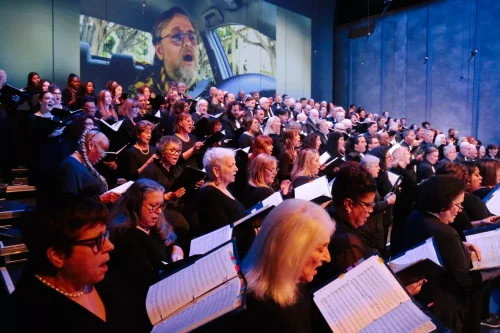
It was my therapist’s idea for me to join an adult choir. It’s OK to laugh. I did.
But I knew why she’d said it. This was 2021 and I was in a dark place. After working as a journalist in New York for a decade, I’d come to Los Angeles to be a screenwriter, as all magazine people inevitably must. But I was starting to think I’d left one crumbling industry for another in serious turmoil. After years of development, a project I loved — something personal produced by heroes of mine — fell apart.
I was too old, I told myself, too late. And that’s just what I’m willing to admit in print. I also felt my father’s memory slipping further away; a retired gym teacher who looked like Mel Brooks, he’d died suddenly four years earlier. But that expansive gulf created by the pandemic made it feel like a million years ago.
I hadn’t sung publicly since my college a cappella days some 20 years ago, an experience that inspired me to write the book “Pitch Perfect,” which in turn inspired three films. But my therapist noticed a certain lightness when I talked about singing.
“Seek joy,” she said.
Despite serious misgivings — an adult choir! — I forced myself to audition for Angel City Chorale. This group would save my life in ways I didn’t truly understand until we traveled to Italy in June to perform three concerts, packing arguably the world’s ugliest matching polo shirts.
The tour was arranged to mark the choir’s 30th anniversary, with performances scheduled at three historic venues including the Teatro Romano, an outdoor amphitheater near Florence that’s older than the Vatican. In Treviso, we performed at a four-tiered opera house, the Teatro Mario Del Monaco, in a concert benefiting La Musica di Angela, a local charity raising funds for music therapy for critically ill children and Alzheimer’s patients.
In many ways the tour felt like a celebration of survival — a post-pandemic joyride for a group still rehearsing in masks. It also felt like a throwback to middle-school trips, with tight quarters in random hotels, signature group backpacks and so much gossip. Those two are sleeping together, right? She forgot her passport in the safe! At least two people had to be rushed to the E.R.
There were also moments of stunning musicality. At the amphitheater in Fiesole — basically an Etruscan Hollywood Bowl and nearly just as grand — we performed Christopher Tin’s “Sogno di Volare,” whose lyrics come from Leonardo da Vinci’s writings on flight. (If the song felt more resonant that evening, perhaps that’s because we were singing in the very hills where Da Vinci actually experimented with his flying models.) Still, there was no way around it: This trip was “Pitch Perfect” for old people.
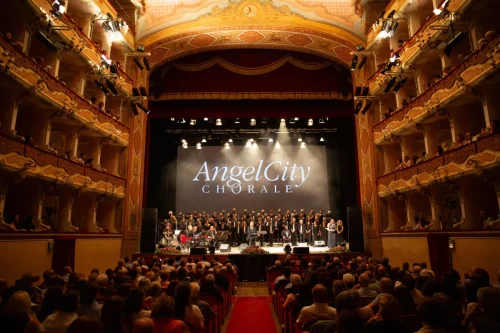
That first movie was about finding a family in an unlikely place. That was surely true for many in the Angel City Chorale: citizens of a notoriously lonely and sprawling city finding community in a community choir.
But this tour revealed deeper, more interesting threads — because of our life experience, not despite it. Desiree Galassi joined the chorale in 2019. She’d previously taught Italian in Fairfield, Conn., 20 miles from Newtown, and had known several families who’d lost loved ones in that town’s deadly 2012 school shooting. When her husband’s work brought them to Southern California in 2015, it was in some ways a relief. Desiree found work at a company that handled logistics for touring acts like Rod Stewart. But she was laid off during the pandemic and felt adrift.
“As a woman in her mid-50s,” Desiree says, “I started feeling unneeded. My kids are grown, and yet I had a lot to give. I wanted to make a difference in ways that even I could not verbalize. My husband would ask me, ‘What do you want to do now?’ I said, I have no idea.” She adds: “The chorale helped me gain back a sense of self-confidence that — somewhere along the way — I lost.”
For Alicia Easley, Angel City promised something else — a welcome distraction from her intense, emotionally draining work. Alicia is a pediatric doctor at a hospital in Los Angeles. She does not mince words: “Children die. There’s no getting around that in my job. Being in the medical field, you tend to get into a tunnel vision-type situation where you’re just working, working, working.” The chorale offers both an escape and an identity, she offers: “I’m trying to see the world and find things outside of medicine.”
Adults find identities by joining all sorts of activities, from pub trivia teams to book clubs to throwing axes at a neighborhood bar. But there’s something undeniably transcendent about music. And it’s true for many in this ragtag choir that includes (among others) an IT software specialist, a Los Angeles Superior Court judge, an Uber driver, a onetime Disney parks performer, a PhD candidate and at least two dentists. Says Alicia: “I may be giving too much information here, but I’ve struggled with my spiritual journey.” But when she sings, she says: “I feel this connection to God — to the universe — that supersedes what I was feeling before.”
I am not a religious person. But something happened on this trip that I can’t explain. We were scheduled to perform a joint concert in Venice alongside a local choir founded by Andrea D’Alpaos, a lanky Italian who got his first gospel cassette tape on a trip to the States as a kid. It would be held at La Scuola Grande di San Rocco, a celebrated 16th century building where Stravinsky had one of his final premieres. We performed a TV medley that included the “Friends” theme song. But still, the place really was a stunner — all marble floors with massive Tintoretto masterpieces affixed to the walls and to the ceiling.
“Besides the Doge’s Palace,” a local told me, “this is the most beautiful building in Venice.”
Our rehearsal was, in a word, punishing. A scorching heat wave had gripped Italy and this historic pile of bricks (described as Tintoretto’s own Sistine Chapel) was steamy hot; for reasons I’ll never understand, we were instructed to wear those custom polos and a pool of sweat — no, a Jacuzzi — had formed in the small of my back.
Then this Italian choir — some 27 members or so — joined us on the risers to run through a spiritual, “Baba Yetu.” Angel City had previously sung this one on NBC and the Venetians somehow learned our choreography from a hastily recorded cellphone video. We were strangers in every conceivable way except for this one song, sung in Swahili and adapted from “The Lord’s Prayer.”
Our two groups had never met before, and had barely warmed up before running the number. But our voices blended seamlessly and I found myself in tears.
Which brings me to the moment that cracked my cynical heart. Because this group we performed with? Andrea’s small but mighty choir at La Scuola Grande di San Rocco — a building named for the patron saint of pandemics — they were called the Joy Singers.
I shared my therapist’s missive with Andrea — “Seek joy” — and he smiled: “Here we are.”
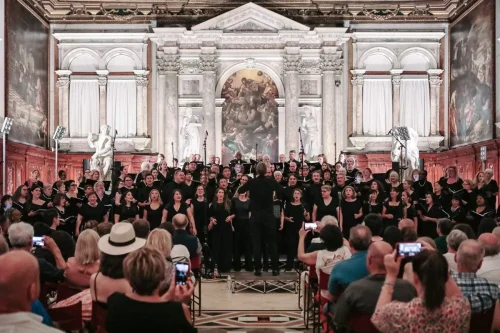
In his book about making art, “The Creative Act: A Way of Being,” the legendary music producer Rick Rubin talks about faith and coincidences, describing it “almost as if another hand guiding you in a certain direction. As if there is an inner knowing gently informing your movements. Faith allows you to trust the direction without needing to understand it.”
What keeps me coming back the choir, I realized on this trip, is something unspoken and mysterious. I had come to think of it as a kind of church. It’s where you go when you’re confused, when you don’t have the answers. You don’t have to do anything, or talk to anyone. You just have to show up.
Sue Fink had hoped this trip would be a bonding experience for the chorale; though she hasn’t said so publicly, she is taking a sabbatical in 2024. While she seemingly has boundless energy, some wonder if she’ll come back.
The Rev. D.T. Paredes, senior pastor at the Faith Community Foursquare Church in South L.A. and a longtime member of the chorale, has known Sue for more than 50 years; he’d been one of her first students when she taught music at the Louis Pasteur Middle School south of Pico. Paredes had been a precocious teenager, sizing his new teacher up on her first day of school, telling Sue: “I know your kind. Poor little rich girl, probably born with a silver spoon in your mouth, decided to break with the family tradition and do music and come into the inner city and teach the children.”
He liked her immediately. Still does. “This choir is an outgrowth of her personality. I can’t imagine who would lead them.”
Of the sabbatical, Sue tells me: “I need the break. At some point I’m going to retire. I’m not ready to do it now. But I have to see what it feels like — for this not to be my whole life. I want to travel. I have to clean my house. I want to go to Morocco.”
Why Morocco? She smiled: “Because that’s where my purse is from. It was my mother’s. She gave it to me in high school and I’ve carried it ever since. I want to see where my purse came from.”
Mickey Rapkin is a screenwriter, journalist and the author of “Pitch Perfect.” He lives in Los Angeles.
